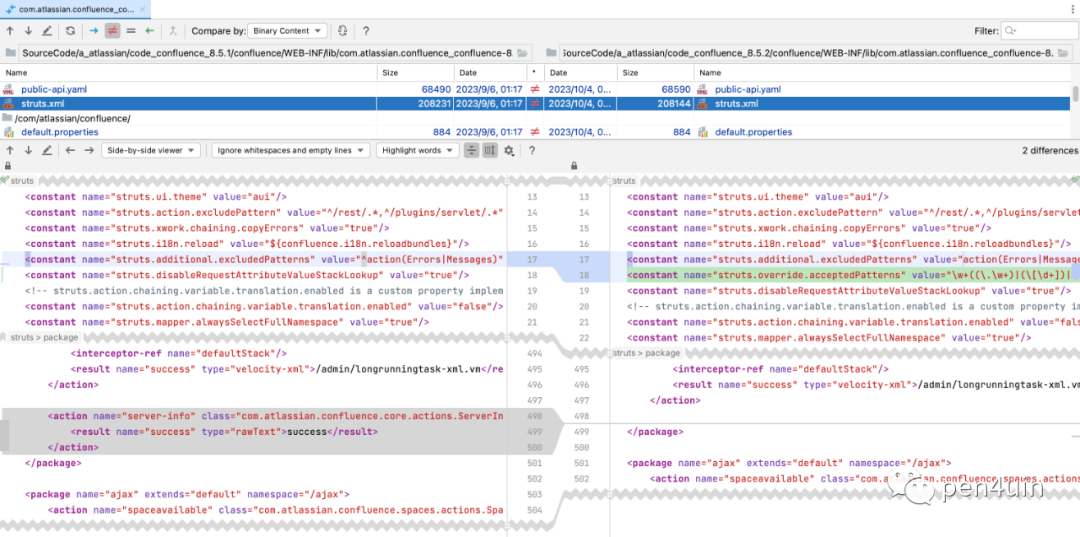
0x01 写在前面
本篇文章只做分析,不提供可利用 payload
上周三,Atlassian 在安全公告日发布了 CVSS 评分为 10分的 CVE-2023-22515, 假期写了篇简陋的复现笔记发在司内部群里。现在距离通告发布已经快一周了,目前还没看到有人公开细节,索性把简陋笔记补充后拿来丰富一下公众号内容,虽然很久不发漏洞分析了,但这个洞我觉得应该值得一篇原创。
0x02 漏洞分析
漏洞通告分析
/setup/setupadministrator.action 添加管理员就行,当搭好环境进行测试时会提示已经完成安装(Setup is already complete),说明这里需要进行绕过
修复版本对比
建议选择修复版本的相邻版本进行分析,干扰会小一些
confluence 的核心代码在 com.atlassian.confluence_confluence-8.x.x.jar,使用 idea 进行对比,发现有两个值得注意的变动
1、struts2.xml
修复版本新增了 struts.override.acceptedPatterns 修复版本删除了 server-info action
2、BootstrapStatusProviderImpl
修复版本对属性 setupPersister 和 applicationConfig 做了限制
对比这两个属性 ReadOnly 前后的差异 可以发现修复版本对 setter 进行了重写
只要对 struts2 系列漏洞原理有所了解,看到这儿应该就大致可以理解该漏洞了;如果看到这里还没有思路,建议背诵 su18 大哥的 《Struts2 系列漏洞调试总结》 一文
漏洞触发点在 struts2 框架中的位置图 (by su18)
结合这张图对所有 interceptor 进行分析,最终定位到漏洞点 -> ParametersInterceptor
<interceptor name="params" class="com.atlassian.xwork.interceptors.SafeParametersInterceptor"/>
定位到漏洞点后,就该考虑如何使请求走到 params interceptor 中
根据配置文件的如下配置,可以发现有两个 interceptor stack 中定义了 params interceptor
defaultStack
<interceptor-stack name="defaultStack">
<interceptor-ref name="profiling">
<param name="location">Before defaultStack</param>
</interceptor-ref>
<interceptor-ref name="securityHeaders"/>
<interceptor-ref name="setupIncomplete"/>
<interceptor-ref name="transaction"/>
<interceptor-ref name="params"/>
...
</interceptor-stack>
opensearch
<interceptor-stack name="opensearch">
<interceptor-ref name="securityHeaders"/>
<interceptor-ref name="transaction"/>
<interceptor-ref name="params"/>
...
</interceptor-stack>
所以只需要找到指定了defaultStack / opensearch 作为 interceptor stack 的action 即可
这里其实会有一个疑问,v8.x 之前版本使用的 xwork 框架也是存在类似问题的,但为什么不受该CVE影响呢?
利用思路整理
1、大致思路
利用 ParametersInterceptor 的属性覆盖绕过 /setup/* 路由的限制,访问 /setup/setupadministrator.action 添加管理员
2、需要覆盖属性是什么
具体的属性应该和 setupPersister 和 applicationConfig 相关联,因为修复版本对其做了限制
3、如何定位该属性
每个人都有自己不同的经验参考,这里以响应 title 作为破题点
步骤如下:
4、思路补充
找到能触发 ParametersInterceptor 的 action,然后覆盖 setupComplete 绕过 SetupCheckInterceptor 对 /setup/* 路由的限制,然后访问 /setup/setupadministrator.action 添加管理员。
0x03 漏洞复现
1、正常访问,提示已经完成安装(Setup is already complete)
GET /setup/setupadministrator-start.action HTTP/1.1
Host: 10.37.129.6:8090
Connection: close
2、覆盖 setupComplete 属性
POST /xxxxxx.action HTTP/1.1
Host: 10.37.129.6:8090
Connection: close
Content-Type: application/x-www-form-urlencoded
Content-Length: 61[打码]
3、成功绕过,添加管理员即可
0x04 漏洞复盘
解答一下遗留问题
v8.x 之前的版本使用的 xwork 框架也存在类似问题的,但为什么不受该CVE影响呢
7.19.15
confluence-7.19.15.jar!/xwork.xml
<interceptor name="params" class="com.atlassian.xwork10.interceptors.SafeParametersInterceptor"/>
SafeParametersInterceptor 操作属性的实现在 SafeParametersInterceptor#before 中,这里解析的参数都是经过安全过滤的,所以无法进行利用
protected void before(ActionInvocation invocation) throws Exception {
if (!this.shouldNotIntercept(invocation)) {
Action action = this.versionSupport.extractAction(invocation);
// 这里做了安全限制,对传入的参数进行了过滤,对代码细节感兴趣的读者可自行分析
Map<String, Object> parameters = this.filterSafeParameters(ActionContext.getContext().getParameters(), action);
...
if (parameters != null) {
OgnlValueStack stack = ActionContext.getContext().getValueStack(); Map.Entry entry;
String name;
// 解析经过过滤后的参数(参数名实际上就是OGNL语句), 这里也就解释了为什么低版本“目前”无法利用的原因
for(Iterator var6 = parameters.entrySet().iterator(); var6.hasNext(); stack.setValue(name, entry.getValue())) {
8.0.0
com.atlassian.confluence_confluence-8.0.0.jar!/struts.xml
<interceptor name="params" class="com.atlassian.xwork.interceptors.SafeParametersInterceptor"/>
SafeParametersInterceptor 操作属性的实现在 SafeParametersInterceptor#doIntercept 中
public String doIntercept(ActionInvocation invocation) throws Exception {
this.before(invocation);
return super.doIntercept(invocation);
}
分析 this.before() 可以发现其实和旧版版的实现是差不多的,”目前“不存在漏洞
protected void before(ActionInvocation invocation) throws Exception {
if (!this.shouldNotIntercept(invocation)) {
Action action = (Action)invocation.getAction();
Map<String, Object> parameters = this.filterSafeParameters(this.retrieveParameters(invocation.getInvocationContext()), action);
...
if (parameters != null) {
ValueStack stack = ActionContext.getContext().getValueStack(); Map.Entry entry;
String name;
for(Iterator var6 = parameters.entrySet().iterator(); var6.hasNext(); stack.setValue(name, entry.getValue())) {
重点来了,后续调用了 super.doIntercept(),其对参数没有任何安全处理,直接就触发了 ognl sink setValue,造成属性覆盖,因此可以被利用
// com.opensymphony.xwork2.interceptor.ParametersInterceptor#doIntercept
public String doIntercept(ActionInvocation invocation) throws Exception {
Object action = invocation.getAction();
if (!(action instanceof NoParameters)) {
ActionContext ac = invocation.getInvocationContext();
// 获取传入的参数
HttpParameters parameters = this.retrieveParameters(ac);
if (LOG.isDebugEnabled()) {
LOG.debug("Setting params {}", this.getParameterLogMap(parameters));
} if (parameters != null) {
Map<String, Object> contextMap = ac.getContextMap();
try {
ReflectionContextState.setCreatingNullObjects(contextMap, true);
ReflectionContextState.setDenyMethodExecution(contextMap, true);
ReflectionContextState.setReportingConversionErrors(contextMap, true);
ValueStack stack = ac.getValueStack();
// 参数未经任何安全过滤,this.setParameters 中也没有其他安全过滤,直接触发 sink setValue
this.setParameters(action, stack, parameters);
}
}
}
}
到这里就完成了在代码层面完了对漏洞的分析和理解,至于后续的 rce 利用链,可以参考 CVE-2023-22508,当然也有更简单的姿势,就留给读者自行填坑了。
0x05 小结
挺有意思的一洞,只可惜 v8.x 之前的版本不受影响。
参考链接
https://confluence.atlassian.com/security/cve-2023-22515-broken-access-control-vulnerability-in-confluence-data-center-and-server-1295682276.htmlhttps://su18.org/post/struts2-5/https://struts.apache.org/core-developers/parameters-interceptor
如有侵权请联系:admin#unsafe.sh